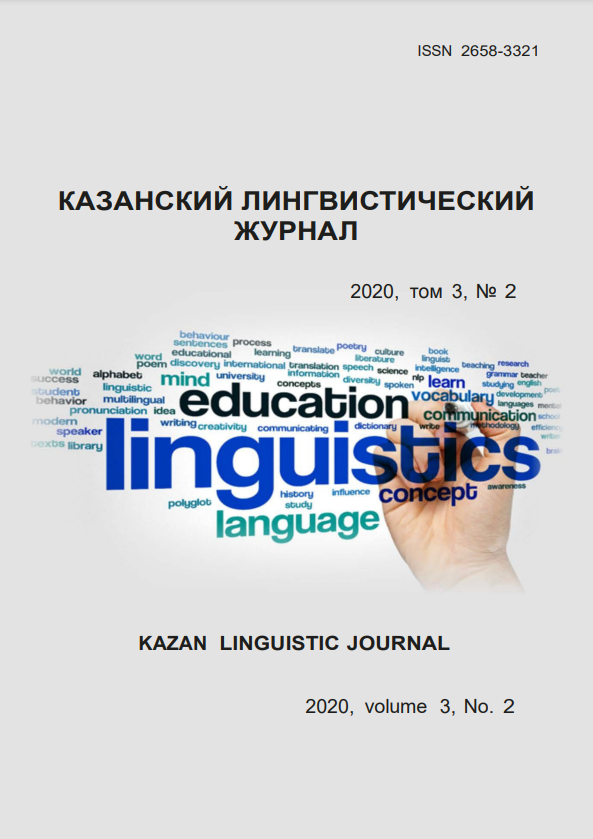Peculiarities of computer terms formation in the Enlish, German and Russian languages
Keywords:
linguistics, language, term, terminological unit, computer terminology, structural peculiaritiesAbstract
The aim of the article is to reveal the peculiarities of formation of English, German and Russian computer terms used in professional technical texts. The study is relevant, because more and more processes in human life involve the use of computer or mobile technologies, new electronic systems and applications are developed, which, in its turn, is reflected in the language. This explains the fact that many works in modern linguistics are devoted to the study of computer terminology which actively penetrates into our life. The paper presents the results of the comparative analysis of computer terminological units in three languages, English, German and Russian. The study showed that the main way of the formation of the German and Russian computer terms is borrowing from the English language, while the English computer terms are formed mainly by morphological means. The terms borrowed from the English language are more changed in the process of assimilation in Russian rather than in German.
References
Литература
Гринев-Гриневич С.В. Терминоведение: учеб. пособие для студ. высш. учеб. заведений. М.: Издательский центр «Академия», 2008. 304 с.
Лейчик В.М. Терминоведение: предмет, методы, структура. Изд. 3-е. М.: ЛКИ, 2007. 256 с.
Лобанова М.А. Структурно-семантические особенности современной компьютерной терминологии: на материале испанского языка: диссертация ... кандидата филологических наук: 10.02.19. Челябинск, 2009. 242 с.
Николова Д. Вариативность компьютерных терминов как специфика формирования компьютерной терминосистемы // Проблемы когнитивного и функционального описания русского и болгарского языков. Шумен: Университетское издательство “Епископ Константин Преславски”, 2017. Т. 11.
№ 11. С. 94-120.
Apche Flink // URL: https://ci.apache.org/projects/flink/flink–docs–release– 1.4/ (дата обращения 01.02.2020).
N2O // URL: https://github.com/synrc/n2o/ (дата обращения 01.02.2020).
Official Java Documentation // URL: https://docs.oracle.com/javase/10/docs/api/overview–summary.html/ (дата обращения 03.02.2020).
Spring Framework 5.0.5 and 4.3.15 available now // URL: https://spring.io/blog/2018/04/03/spring-framework-5-0-5-and-4-3-15-available- now/ (дата обращения 03.02.2020).
Viel mehr als ein Antivirus: Avira Free Security Suite // URL: https://www.avira.com/de/downloads/ (дата обращения 01.02.2020).
Yukhmina E.A. The peculiarities of the representation and functioning of the English borrowings in the associative field of the computer terms / Иностранные языки: лингвистические и методические аспекты. Тверь, 2018.
№42. С.159-163.
Zorina A.V. English-language loan words in modern Russian (by the example of the internet vocabulary) // Kazan linguistic journal. Kazan, 2018, Vol. 1,
№ 2 (1). Pp. 5-14.
References
Grinev-Grinevich, S.V. (2008). Terminovedenie [Terminology]: ucheb. posobie dlya stud. vyssh. ucheb. zavedenii. 304 s. Moscow, Akademiya. (In Russian)
Leichik, V.M. (2007). Terminovedenie: predmet, metody, struktura
[Terminology: subject, methods, structure]. 256 s. Moscow, LKI. (In Russian)
Lobanova, M.A. (2009). Strukturno-semanticheskie osobennosti sovremennoi komp’yuternoi terminologii: na materiale ispanskogo yazyka [Structural and semantic features of modern computer terminology: on the material of the Spanish language]: dissertatsiya ... kandidata filologicheskikh nauk: 10.02.19. 242 p. Chelyabinsk. (In Russian)
Nikolova, D. (2017). Variativnost’ komp’yuternykh terminov kak spetsifika formirovaniya komp’yuternoi terminosistemy [Variability of computer terms as a specific feature of the formation of a computer terminology] // Problemy kognitivnogo i funktsional’nogo opisaniya russkogo i bolgarskogo yazykov. Vol. 11.
№ 11, pp. 94-120. Shumen, Episkop Konstantin Preslavski. (In Russian)
Apche Flink // URL: https://ci.apache.org/projects/flink/flink–docs–release– 1.4/ (accessed: 01.02.2020).
N2O // URL: https://github.com/synrc/n2o/ (accessed: 01.02.2020).
Official Java Documentation // URL: https://docs.oracle.com/javase/10/docs/api/overview–summary.html/ (accessed: 03.02.2020).
Spring Framework 5.0.5 and 4.3.15 available now // URL: https://spring.io/blog/2018/04/03/spring-framework-5-0-5-and-4-3-15-available- now/ (accessed: 03.02.2020).
Viel mehr als ein Antivirus: Avira Free Security Suite // URL: https://www.avira.com/de/downloads/ (accessed: 01.02.2020).
Yukhmina, E.A. (2018). The peculiarities of the representation and functioning of the English borrowings in the associative field of the computer terms
// Inostrannye yazyki: lingvisticheskie i metodicheskie aspekty. № 42. pp. 159-163. Tver’. (In English)
Zorina, A.V. (2018). English-language loan words in modern Russian (by the example of the internet vocabulary) // Kazan linguistic journal. Vol. 1, № 2 (1). pp. 5-14. Kazan. (In English)






